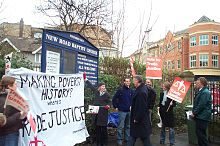- Christian Aid
-
Christian Aid is the official relief and development agency of 40 British and Irish churches and works to support sustainable development, alleviate poverty, support civil society and provide disaster relief in South America, the Caribbean, the Middle East, Africa and Asia. Christian Aid campaigns to change the rules and systems that keep people poor, speaking out on issues such as Tax Justice, trade justice, climate change, and Third World debt. Christian Aid has fought poverty for more than 65 years.
Christian Aid's essential belief is summed up in the statement "We believe in life before death", often used alongside the Christian Aid logo. Christian Aid states it works where the need is greatest, regardless of religion, nationality or race. One of its other messages is Poverty Over, represented by the word Over highlighted within the word Poverty. It works with 570 local partner organisations in 45 countries around the world to help the world's poorest communities. It is a major member of the Stop Climate Chaos, Fairtrade Foundation and Trade Justice Movement campaigns. Its headquarters is in London and has regional teams across the UK and Ireland. Christian Aid also organises the UK's largest door-to-door collection, Christian Aid Week, which takes place in May each year.
Its director is Loretta Minghella who was appointed in 2010. The 2009–2010 income was £104.6 million.
Contents
Post-war reconstruction
Christian Aid was originally known as Christian Reconstruction in Europe, as it was initially concerned with issues of post-World War II welfare, and to help resettle refugees. It became part of British Council of Churches (now Churches Together in Britain and Ireland) in 1949, and changed its name to Christian Aid in 1964. The income of the agency in 1949 was £29,000.
Development projects
The 1970s found Christian Aid funding over 100 long-term development projects in over 40 countries. Reconstruction after various wars in Vietnam, Laos and Cambodia were major projects, alongside the aid given after the overthrow of dictators Idi Amin in Uganda and Somoza in Nicaragua. Yanomami Indians in Brazil were also supported, in a commitment to marginalized indigenous peoples.
Role of banks
The 1980s saw Christian Aid highlight the role of banks in demanding high interest payments for loans during the global economic recession. The media was by now picking up far more on development issues, and the Ethiopian famine and the destruction of the rainforests brought a new focus onto global development and poverty issues.
Trade Justice Movement
Christian Aid has also worked with the Trade Justice Movement to again highlight unjust trade rules.
Fundraising
Christian Aid raises income from a number of sources and in a number of ways.
A significant percentage of the income comes from the thousands of individuals in churches and communities who care passionately about tackling poverty.
The main fundraising moments include:
1. Lent Appeal 2. Christian Aid Week 3. Harvest Appeal 4. Christmas Appeal
Throughout the year supporters give regularly using direct debit, cash donations and Will Aid. Churches and community groups also take part in the annual calendar of events (e.g. walks, soup lunches and quizzes) raising thousands of pounds.
Criticism
Peter Hallward, in his book 'Damming the Flood', accused Christian Aid of supporting US led violent regime change in Haiti in 2004.[1]
The development economist Paul Collier in his book The Bottom Billion suggests that Christian Aid "deeply misinformed" the UK electorate in 2004 and 2005 with a campaign against reducing trade barriers in Africa based on a "deeply misleading" study conducted by an economist without the requisite expertise and whose purported review "by a panel of academic experts" who were two gentlemen chosen by said economist who were also not noted for their expertise on international trade. He quotes an unnamed Chief Economist at the British Department of Trade and Industry as saying "they know it's crap, but it sells the T-shirts"[2].
The NGO Monitor, an Israeli based organisation, claims Christian Aid is biased towards Palestinian interests[3][4]
A report about Palestinian refugees published by Christian Aid in June 2011 was criticized for inaccurate information, including details about Palestinian Abed Rabin complaining that he can't work because of attacks by Israelis. When questioned, the author of the study said that there was no proof of it and instead, it "referred to the situation" in general and not anything specific. In addition, Professor Gerald Steinberg, president of NGO Monitor and a professor of political science at Bar Ilan University, said "the images it uses are emotional manipulation without getting to the core of the issue."[5]
Notes
- ^ [See Peter Hallward's Damming the Flood (Verso, London, 2008)
- ^ Paul Collier The Bottom Billion pp 157-159
- ^ NGO Monitor: "Christian Aid: Continued Bias and Missing Context in Palestinian Agenda: NGO Update January-June 2006
- ^ NGO Monitor: UK parliamentary select committee on International Development discusses NGO Monitor´s evidence on Christian Aid and UK funding for NGOs that work in Israel and with Palestinians
- ^ Christian Aid Palestinian refugees report ' misleading'
External links
Christian Aid's websites
- Christian Aid Web site
- Learn Christian Aid's teaching resources website
- Surefish Christian community and ethical living
- Present Aid Ethical gifts
- Ctrl+Alt+Shift Social networking site
- Platform 2 Global volunteering scheme for 18-25 year
Christian Aid's Corporate Sponsors
- AquAid AquAid have donated over £2 million to Christian Aid since 1998
Categories:- Christian charities
- Development charities based in the United Kingdom
- Religious charities based in the United Kingdom
- International charities
- Religious action on climate change
Wikimedia Foundation. 2010.


